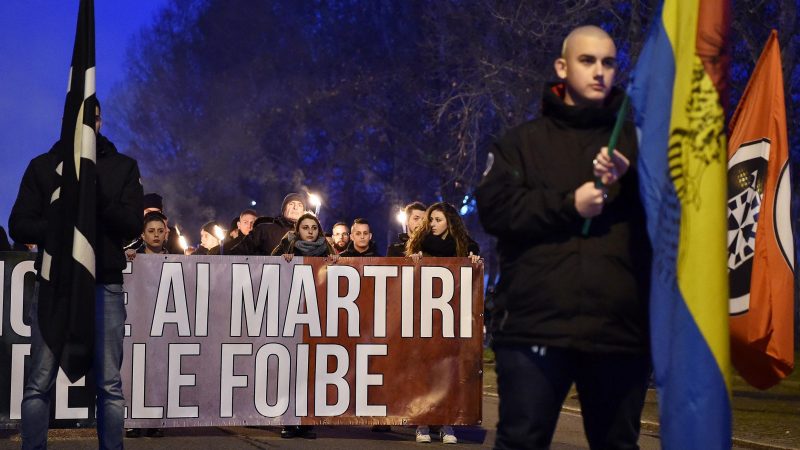
Euractiv (12 February 2019)
Tajani and Salvini had spoken at the event on Sunday in Basovizza, near the Slovenian border, close to where many of the victims were killed by Tito’s Yugoslav partisans.
The victims were often thrown alive into deep sinkholes known as “foibe”.
Salvini made a direct comparison between “the children who died at Auschwitz and the children who died at Basovizza”.
“There are no first- or second-class martyrs,” he said.
“I’m deeply concerned by inadmissible statements by senior Italian officials suggesting that the foibe (killings) represented ethnic cleansing,” Slovenian President Borut Pahor said in a letter sent on Monday to his Italian counterpart Sergio Mattarella.
“It’s unprecedented historical revisionism. Fascism was a fact and its objective was destroying the Slovenian people,” Slovenian Prime Minister Marjan Sarec said in a tweet on Monday.
Speaking at the same event as Salvini on Sunday, Tajani had said “thousands of innocent victims (were) killed for being Italians… by soldiers wearing a red star on their heads.”
He ended his speech by saying “Long live Italian Istria, long live Italian Dalmatia”, referring to what had been Italian territories between the two world wars and which are today part of Slovenia and Croatia.
During Monday’s session of the European Parliament, Tajani said: “I’m sorry if the meaning of my words was misinterpreted. It wasn’t my intention to offend anybody.”
He explained that his reference to “Italian” Istria and Dalmatia “was in no way a territorial claim”.
“I was referring to Istrian and Dalmatian Italian-speaking exiles, their children and grandchildren, many of whom were present at the ceremony,” he went on.
The massacres have long been a source of contention between Italy and Slovenia.
The two countries disagree on the total number of victims of the killings, with figures ranging from the hundreds to over 10,000.
The memory of the killings has also been controversial within Italy.
In the decades after the war, Italy’s attempts to turn the page on its Fascist history, and the crimes committed by its own forces in Yugoslavia, meant that the foibe massacres were largely commemorated only by the far-right.
It was only in 2004 that the right-wing government of Prime Minister Silvio Berlusconi initiated a national day of remembrance for the massacres.
https://www.euractiv.com/section/eu-elections-2019/news/slovenia-accuses-tajani-salvini-of-world-war-ii-revisionism/
No comments yet.
-
 TOKYO PROTESTS OVER SOUTH KOREAN LAWMAKER'S REMARKS ON JAPAN'S EMPEROR
Asia - Pacific
12.02.2019
TOKYO PROTESTS OVER SOUTH KOREAN LAWMAKER'S REMARKS ON JAPAN'S EMPEROR
Asia - Pacific
12.02.2019
-
 KAZAKHSTAN RATIFIES AGREEMENT ON EEU INT’L TREATIES
Asia - Pacific
12.02.2019
KAZAKHSTAN RATIFIES AGREEMENT ON EEU INT’L TREATIES
Asia - Pacific
12.02.2019
- SPAIN: CATALAN SEPARATISTS' TRIAL BEGINS AMID TENSIONS Europe - EU 12.02.2019
- ROMANIA SEEKS TO BLOCK FORMER ANTI-CORRUPTION OFFICIAL FROM TOP EU POST The Balkans 12.02.2019
- A NEW ERA FOR SECURITISATION? Europe - EU 12.02.2019
-
19.04.2024
Türk-Ermeni İlişkileri Üzerine Ömer Engin Lütem Konferansları 2023 -
11.04.2023
Türk-Ermeni İlişkileri Üzerine Ömer Engin Lütem Konferansları 2022 -
27.03.2023
RADİKAL ERMENİ UNSURLARCA GERÇEKLEŞTİRİLEN MEZALİMLER VE VANDALİZM -
17.03.2023
PATRIOTISM PERVERTED -
23.02.2023
MEN ARE LIKE THAT -
03.02.2023
BAKÜ-TİFLİS-CEYHAN BORU HATTININ YAŞANAN TARİHİ -
16.12.2022
INTERNATIONAL SCHOLARS ON THE EVENTS OF 1915 -
07.12.2022
FAKE PHOTOS AND THE ARMENIAN PROPAGANDA -
07.12.2022
ERMENİ PROPAGANDASI VE SAHTE RESİMLER -
30.03.2022
Türk-Ermeni İlişkileri Üzerine Ömer Engin Lütem Konferansları 2021 -
01.01.2022
A Letter From Japan - Strategically Mum: The Silence of the Armenians -
01.01.2022
Japonya'dan Bir Mektup - Stratejik Suskunluk: Ermenilerin Sessizliği -
11.02.2021
Türk-Ermeni Uyuşmazlığı Üzerine Ömer Engin Lütem Konferansları 2020 -
03.06.2020
Anastas Mikoyan: Confessions of an Armenian Bolshevik -
08.04.2020
Sovyet Sonrası Ukrayna’da Devlet, Toplum ve Siyaset - Değişen Dinamikler, Dönüşen Kimlikler -
18.03.2020
Türk-Ermeni Uyuşmazlığı Üzerine Ömer Engin Lütem Konferansları 2019 -
08.03.2019
Türk-Ermeni Uyuşmazlığı Üzerine Ömer Engin Lütem Konferansları 2018 -
12.06.2018
Ermeni Sorunuyla İlgili İngiliz Belgeleri (1912-1923) - British Documents on Armenian Question (1912-1923) -
02.12.2016
Turkish-Russian Academics: A Historical Study on the Caucasus -
01.07.2016
Gürcistan'daki Müslüman Topluluklar: Azınlık Hakları, Kimlik, Siyaset -
10.03.2016
Armenian Diaspora: Diaspora, State and the Imagination of the Republic of Armenia -
24.01.2016
Ermeni Sorunu Temel Bilgi ve Belgeler (2. Baskı)
-
AVİM Conference Hall 24.01.2023
CONFERENCE TITLED “HUNGARY’S PERSPECTIVES ON THE TURKIC WORLD"









